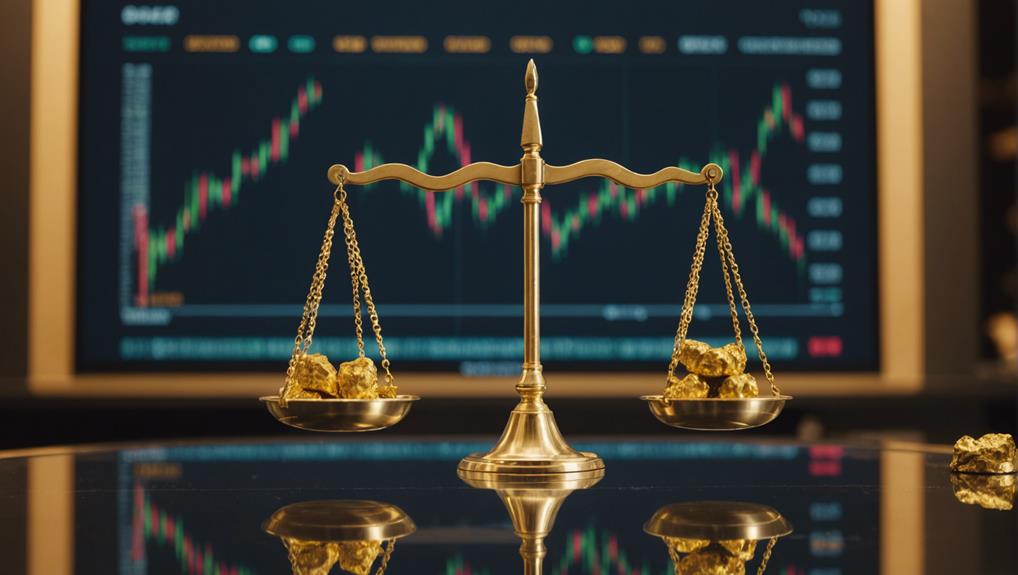Insider trading in the gold mining sector involves trading company shares based on confidential, vital information not available to the public. This can skew the market by misinforming investors about a company's actual value, leading to unjust advantages and often drastic fluctuations in stock prices. Globally, stringent laws are enforced to maintain fairness; offenders face heavy fines or imprisonment. Techniques like transaction audits, communication surveillance, and data analytics are used to detect such illegal activities. Knowing these impacts helps you understand the deeper dynamics of market fairness and shifts your perspective on investment decisions. There's always more to uncover in this intriguing sector.
Defining Insider Trading

Insider trading involves buying or selling a publicly-traded company's stock by someone who possesses non-public, material information about that stock. This practice can give you an unfair advantage over other investors who don't have access to this information.
You're dealing with a form of illegal activity that can undermine investor confidence and the market's integrity. It's not merely about having insider information, but navigating on it to trade stock. U.S. securities laws aim to promote transparency and fairness in the market, which insider trading violates.
If you're caught, you could face severe penalties, including fines and imprisonment. Understanding these rules is essential if you're navigating the investment waters, ensuring you stay on the right side of the law.
Recent Insider Cases

As you investigate recent insider cases in the gold mining sector, you'll find that the legal consequences for such activities are stringent and widely enforced.
Notable insider transactions have come under scrutiny, exposing patterns and specific instances that serve as prime examples.
These cases help illuminate how insider trading is detected and prosecuted within this industry.
Legal Consequences Examined
Recent legal cases often highlight the severe penalties faced by those caught engaging in insider trading within the gold mining sector. You've got to understand that breaches of this law can lead to significant punishments. Here are some typical consequences:
- Heavy Fines: Financial penalties can run into millions of dollars, enough to cripple personal finances.
- Prison Sentences: Jail time is a real possibility, ranging from a few years to over a decade.
- Career Impact: The stain on professional reputation often means the end of a career in finance or mining.
- Legal Costs: Defending against insider trading charges can be financially draining due to high legal fees.
It's important you're aware of these risks if you're in a position to access sensitive information.
Notable Insider Transactions
Several high-profile cases have emerged, demonstrating the serious consequences of insider trading in the gold mining sector. You should be aware of these incidents as they underline the risks and legal implications associated with non-public information misuse.
| Case Name | Year | Outcome |
|---|---|---|
| GoldX Traders Inc. | 2019 | CFO jailed, fined $500,000 |
| PureGold Secrets | 2021 | Two traders convicted, on bail |
| MineCo Insider | 2022 | CEO resigned, under investigation |
| Golden Info Leak | 2023 | Analyst fined, barred from trading |
These cases illustrate the stringent enforcement of insider trading laws. If you're involved in the sector, it's essential to stay informed and adhere strictly to legal standards to avoid similar pitfalls.
Effects on Market Prices

Insider trading in the gold mining sector can significantly distort market prices, misleading investors about the true value of a company. When insiders buy or sell based on non-public information, they can cause sudden fluctuations in stock prices that don't reflect the company's actual financial health or operational success. This can impact your investment decisions and the fairness of the market.
Key impacts include:
- *Artificial inflation or deflation of stock prices*
- *Erosion of investor confidence in market integrity*
- *Unpredictable market volatility*
- *Disadvantages for regular investors who lack access to insider information*
You'll find that these effects can skew the playing field, making it tough for you to make informed decisions based solely on publicly available data.
Legal Framework Overview

Given these market impacts, let's examine the legal framework that governs insider trading in the gold mining sector. You'll find that the rules are stringent, aiming to maintain market integrity and protect investors. At the core, these regulations prohibit trading based on non-public, material information. This includes any confidential data that could influence an investor's decision about buying or selling stocks.
Securities and Exchange Commissions worldwide enforce these laws, requiring transparency and timely disclosure of all pertinent information by the companies. If you're in the sector, you must regularly report any significant financial dealings or findings. Non-compliance can lead to severe penalties, including fines and imprisonment, ensuring that everyone plays by the rules to keep the trading environment fair and informed.
Investigative Techniques

To effectively monitor compliance with these regulations, authorities employ a range of investigative techniques. Understanding these methods will help you appreciate how seriously the sector takes insider trading.
- Communication Surveillance: Authorities monitor emails and phone calls to detect suspicious patterns.
- Transaction Audits: Every trade is scrutinized, looking for irregularities against market norms.
- Whistleblower Incentives: Financial rewards encourage insiders to report illicit activities.
- Data Analytics: Advanced software analyzes vast amounts of data for signs of insider trading.
Enhancing Market Fairness

To ensure the gold mining sector operates fairly, you'll need to understand the importance of strengthening regulatory oversight.
You can additionally play a part by promoting transparent practices in all your business interactions.
These steps help to mitigate the risks of insider trading and build trust among investors and the public.
Strengthening Regulatory Oversight
Enhancing regulatory oversight in the gold mining sector ensures a fairer market for all stakeholders. By strengthening oversight, you're not merely protecting investments; you're also upholding the integrity of the financial markets. Here's how:
- Frequent Audits: Ensuring compliance through regular checks.
- Stricter Penalties: Deterrents for those contemplating unethical actions.
- Enhanced Disclosure Requirements: Keeping everyone informed about significant decisions.
- Training Programs: Educating stakeholders on ethical practices and regulations.
These measures can significantly reduce the instances of insider trading. By holding companies accountable and ensuring that all actions are above board, you're helping to stabilize the market and protect the interests of small investors and major shareholders alike. Bear in mind, a transparent market is a healthier market.
Promoting Transparent Practices
Promoting transparent practices in the gold mining sector levels the playing field and boosts market fairness.
You'll see that by implementing stringent disclosure rules, companies must regularly share their financial activities and mining reports. This transparency deters insider trading by making information accessible to everyone at the same time.
Implementing advanced technology, like blockchain, can further secure data and track the origins of gold, ensuring that all transactions are visible and verifiable.
This isn't merely about keeping things above board; it's about building trust with investors and the public. When you know that a company plays by the rules, you're more likely to invest with confidence.
Transparent practices don't only protect the market—they strengthen it.
Conclusion
In wrapping up, the murky waters of insider trading in the gold mining sector are troubling. They tilt the scales of fairness and corrode trust among investors. The strategies we've discussed to tackle this issue are vital for restoring balance and ensuring everyone has a fair shot in the market. Be on your guard and keep an eye on market activities, as staying transparent is crucial for the market's integrity and health.
It's evident that the traditional financial and political systems favor the wealthy, leaving everyday investors at a disadvantage. Banks seem to construct a fortress around the affluent, sidelining the average person who wishes to grow their wealth. This distrust in banks, the monetary system, and politicians grows as they repeatedly show a preference for the rich.
This disdain for the current financial system drives my preference for more autonomous financial control. Why trust these entities with your hard-earned money when you can manage it on your terms? To navigate this biased landscape, educating yourself about alternative investment opportunities like gold is crucial.
Gold stands as a beacon of stability in a financial system skewed in favor of the affluent. If you're ready to take control of your financial future, away from the grasping hands of big banks and the elite, consider gold. It's not just an investment; it's a statement of independence and empowerment.
Don't just take my word for it; arm yourself with knowledge by requesting your free gold information kit today. This is your first step towards financial liberation.
The Gold Information Network
11900 Biscayne Blvd, Ste 127B, Miami, FL 33181
(305) 449-9094
https://goldinfo.net







